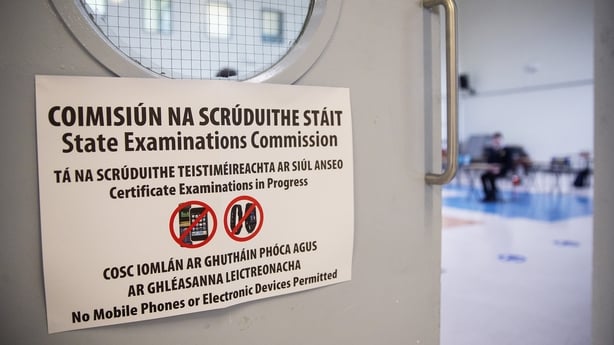Concerns are being raised about the artificial boosting of Leaving Certificate exam grades as results were delivered to more than 62,000 students this morning.
Minister for Education Norma Foley said she ordered the adjustment in fairness to students who had not sat Junior Cycle exams and who had undergone remote teaching and learning.
The adjustment has been made following a promise made by Minister Foley that results received by the class of 2023 would be no lower than last year's.
This year's post-marking adjustment is higher than that applied to last year’s results.
Last year’s marks were artificially increased by an average of 5.6%. This year, the average hike is 7.9% and 71% of all grades awarded have risen as a result, compared to 50% last year.
A Career Guidance teacher at Loreto Stephen's Green, in Dublin, said there was a lot of surprise over the decision with many who work in the education sector expecting grade inflation would come down slightly this year.
Donnchadh O Mahony said third level institutions are concerned that some students are not able for academic programmes, which results in higher drop out rates.
Speaking on RTÉ's Today with Claire Byrne, he added that students achieving the maximum 625 points are not guaranteed a place on a course where random selection is applied.
Mr O Mahony said while "in practicality" it does not leave the class of 2023 in any worse situation than the class of 2022, he questioned how the minister will get back to "normal standards".
"I just don't know what she is going to do here."
Speaking on RTÉ's Morning Ireland, Minister Foley said this year's Leaving Cert students have faced "significant challenges over the past couple of years" as most had not taken a State exam before.
"In the interest of fairness to them, I did make the determination that the overall grade profile this year would be similar to that which was achieved last year," Ms Foley said.
"It was in the interest of recognising their unique circumstances of a group of students who didn't sit junior cycle and did have to grapple with the significant amount of remote teaching and learning."
We need your consent to load this rte-player contentWe use rte-player to manage extra content that can set cookies on your device and collect data about your activity. Please review their details and accept them to load the content.Manage Preferences
The ongoing adjustment of marks means that current Leaving Certificate grades remain inflated compared to those awarded prior to the pandemic.
This year's outcomes, like those of the past two years, are 7% higher than student outcomes in 2019.
This is the third year of disruption to the setting and marking of exams due to the Covid-19 pandemic.
Read more: Does Leaving Cert grade inflation really matter?
The State Examinations Commission said that the stronger adjustment was needed because this year's base aggregate results were significantly lower than those of 2022.
They were closer to marks received in 2019, before the pandemic disruption.

On when grade inflation will end, Ms Foley said: "Every group of students are unique and we have to look at their unique circumstances at a given time.
"This particular group were different to the previous group, particularly this group where the students who didn't have the opportunities at the junior cycle.
"That was an enormously important consideration for me. And next year, students will be different. They would have unique set of circumstances as well.
"So, we will look at each group of students and give them the due consideration that they require."
Students will receive their adjusted marks today but can view their original marks and see the adjustments that were made from next Tuesday.
Impact of Covid
In relation to universities criticising inflated grades amid - concerns that it could lead to an increased drop-out rate - Ms Foley said: "Covid has most certainly had an impact in terms of Leaving Certificate, but also we have seen a significant impact at a third level as well.
"For example, a Higher Education Authority report in the past year has pointed to the fact that we've seen a 23% increase in first class honours being conferred at third level.
"So, grade inflation is not unique to what is happening at post primary.
"However, notwithstanding that I think it's important to acknowledge all of the students have received a similar uplift this year. That was fair. There was nothing fair about Covid. So, we had to ensure that we were conferring fairness for the students."
Minister Foley added that the third level institutions are doing "the job of work that they have to do".
"We're doing the job of work that we have to do at post primary," she said.
Teacher shortage
Minister Foley acknowledged there are "challenges" for schools to fill teacher posts, but added they are "not standing still" when it comes to tackling the issue.
"We have taken a whole series of proactive measures, either short-term, medium-term or long-term," she said.
Some 600 additional places have been made available for initial primary teacher education over two years, Minister Foley added.
Read more: Schools struggling with severe teacher recruitment and retention crisis - TUI
There have never been as many teachers in the education system as there have been in the past few years, the minister said, with 4,500 additional posts at primary and the same figure at post primary.
She said they have also introduced measures to incentivise teachers abroad to come home to teach.
"We have a 22% increase in those who have registered for the Teachers Council specifically in relation to teachers who are teaching abroad," Minister Foley said.
